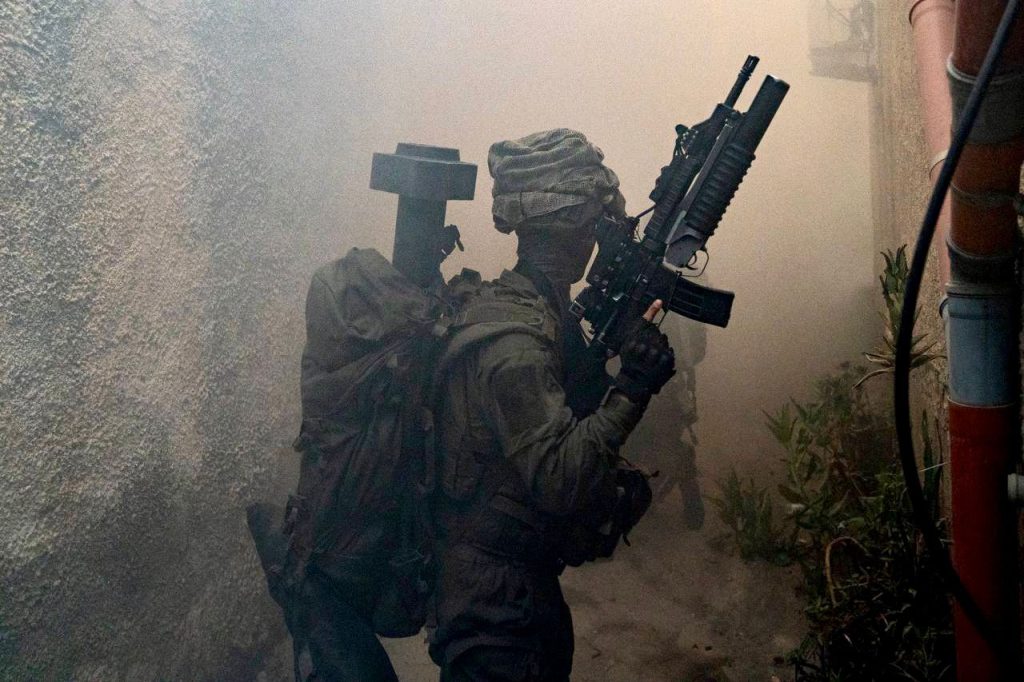IN THE MEDIA
Denying Israel’s right to stop terrorists undermines peace
July 18, 2023 | Jamie Hyams

The Australian – 18 July 2023
You would think it’s a basic right of any country to defend its population against terrorism. However, as is seemingly the case with everything Israel does, its recent two-day military operation against terrorists and their infrastructure in the West Bank city of Jenin aroused much comment and controversy. It is therefore important to understand the context of the campaign, what the Israeli forces actually did in Jenin and why.
The past eight months have seen an upsurge in terrorism emanating from the West Bank. In hundreds of attacks, at least 28 Israeli civilians have been killed. Some were gunned down at restaurants, while leaving a synagogue service or driving in their cars. Others were killed by a bomb while waiting at a bus stop, or deliberately run over by terrorists driving cars. All were innocently going about their lives, and all of these deadly attacks were linked to Jenin.
Perhaps even more sinisterly, a rocket was fired from Jenin towards Israel. This was the first rocket fired at Israel from the West Bank, and while it fell within the West Bank, the potential implications are enormous. The many thousands of rockets that have been fired at Israel from Gaza since Israel withdrew from the Strip are bad enough, but sustained rocket fire from the West Bank would all but paralyse Israel. Tel Aviv is only 18 km from the West Bank, Israel’s only international airport is about half that distance away, and Israel’s industrial heartland and most of its population centres are also within 18 km, or seconds as the rocket flies.
The background to this violence is even more troubling. The Palestinian Authority, which is meant to have security control over the area that includes Jenin, actually has no authority there at all. Instead, the area is run by a loose confederation of armed gangs, including members of Hamas and Palestinian Islamic Jihad, as well as smaller less known groups such as the Jenin Brigades.
Apart from being terrorists committed to Israel’s destruction, these groups have one other thing in common. They are all funded, armed and directed by Iran, as part of its strategy to encircle Israel. Iran encourages the terror groups to embed themselves among civilians, in the hope that any resultant civilian casualties will aid its diplomatic campaign against Israel.
Faced with this ongoing terrorism, Israel had no choice but to act to protect its citizens – the primary responsibility of any government. Early on the morning of July 3, Israeli forces commenced the operation, specifically targeting terrorists inside the Jenin refugee camp. Precisely targeted drone strikes were successfully directed at infrastructure including a building that acted as a combined command centre for the groups, and weapons storage facilities.
Armoured bulldozers tore up the roads to disable and destroy embedded mines and IEDs, and they were followed by approximately 1000 Israeli troops. Twelve Palestinians were killed in the fighting that followed, all of them combatants and members of terrorist groups. While Israel has been condemned in some quarters for killing children, these children were actually 17-year-old armed terrorists. One Israeli soldier was also killed.
The Israelis arrested dozens of terrorist suspects, but others, including some wanted for murdering Israeli civilians, escaped, many by mixing with civilians and some of them even in ambulances. Vast quantities of weapons, explosives and ammunition were also captured. The terrorists sheltered in and fired from a hospital and a mosque, and when the Israeli forces entered the mosque, they found PIJ was using it as a command centre, and there were large quantities of weapons stored there, including in pits beneath the mosque’s floor.
Sadly, leaders of the Fatah party of Palestinian President Mahmoud Abbas, including Palestinian Prime Minister Muhammad Shtayyeh, made inflammatory statements encouraging the terrorists, while some of the fighters in Jenin are also affiliated with Fatah, which is meant to be Israel’s peace partner.
Predictably, the UN, so-called human rights organisations and many media commentators have also been quick to criticise Israel, while overlooking the terrorism which made the operation necessary, the cynical tactics of the militants and the fact that Israel minimised the risk to Palestinian civilians, none of whom were killed, by exposing its own soldiers to danger.
The terrorist groups and their Iranian overlords have a very simple calculus, which they see as a win-win situation. They attack Israeli civilians to undermine Israeli morale, while knowing any response by Israel to prevent further attacks will be widely condemned. There is only one way for the international community to end this deadly calculus – by placing the blame with the terrorists, where it justly lies, and speaking up for Israel’s right, and duty, to do what it needs to do to protect its civilians.
Jamie Hyams is a senior policy analyst at the Australia/Israel & Jewish Affairs Council.
Tags: Israel, Palestinian Authority, Palestinians





